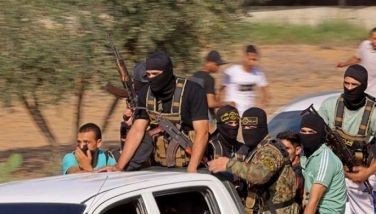Tensions run high between Azerbaijan, Armenia despite truce
MOSCOW — More than two decades after a conflict killed about 30,000 people and displaced 1 million others, tensions between Armenia and Azerbaijan over the region of Nagorno-Karabakh have exploded again, with both sides engaged in artillery duels, rocket barrages and tank attacks.
A cease-fire declared yesterday after three days of intense battles raised hopes for restoring calm to the area in the South Caucasus mountains. But fears loom of a possible escalation in fighting, with Turkey strongly backing Azerbaijan and Russia obliged to protect Armenia by a mutual security pact.
Clashes that began over the weekend marked the worst violence since a separatist war ended in 1994 and left Nagorno-Karabakh — officially a part of Azerbaijan — under the control of local ethnic Armenian forces and the Armenian military. Armenian forces also occupy several areas outside the Karabakh region.
Peace talks under the auspices of the Organization for Security and Cooperation in Europe, co-sponsored by Russia, the United States and France, have dragged on ever since without producing any visible results.
While Armenia appeared happy with the status quo, energy-rich Azerbaijan, which has lost control of about one-seventh of its territory in the conflict, has been desperate to change the situation.
Both countries blamed each other for the latest hostilities, but many observers believe that Azerbaijan's military unleashed an offensive aiming to seize some ground in order to make Armenia more likely to discuss a compromise in peace talks.
"Baku knows that one of its few tools of pressure on the Armenians is to violate the cease-fire and remind them that the status quo can be shaken," Thomas de Waal, an expert on the region with the Carnegie Endowment, wrote in a commentary.
Azerbaijani leaders in Baku long have promised to win back the occupied lands, and President Ilham Aliyev may have been forced to act while a reversal in the country's oil fortunes has tested public support for his government.
The operation in Karabakh was well-received in Azerbaijan. In the village of Gapanli, one of the areas hit hardest by the current fighting, residents enthusiastically welcomed the action against the Armenian forces, hoping Azerbaijan could win back the occupied territories.
"This is our land," said villager Elmar Abdullayev. "We will stand up for our rights till the end."
Both Azerbaijani and Armenian forces have used artillery, tanks and other heavy weapons on a scale unseen since 1994. Enemy losses were put in the hundreds, rival claims that couldn't be independently verified and which were promptly denied by the opposing side. Each party put its own losses in the dozens.
When oil prices were high, Azerbaijan used its petrodollars to upgrade its military, with most of its new weapons, including heavy artillery, rocket launchers and tanks, provided by Russia.
That angered many in Armenia, which has hosted a Russian military base and maintained close security and economic ties with Moscow. While arming Azerbaijan, Russia also has supplied new weapons to Armenia.
The parallel arms sales to the bitter rivals have reflected Russia's desire to expand its influence in the strategic South Caucasus region, which has been a key conduit for energy resources from the Caspian Sea to the West. If the Karabakh conflict escalates, it could disrupt oil and gas shipments from the region.
Amid the fighting, Karabakh's military command already has threatened to target Azerbaijan's energy pipelines with short-range ballistic missiles if the country's forces launch artillery barrage against the region's central city, Stepanakert, and other populated areas.
"Azerbaijan should be aware of the price it will have to pay in case of further escalation," said Sergei Minasyan, a deputy director of the Caucasus Institute, a think tank based in Armenia's capital of Yerevan. "It's the destruction of oil and gas infrastructure."
Russian President Vladimir Putin had separate phone conversations yesterday with the leaders of Azerbaijan and Armenia, urging them to honor the cease-fire, the Kremlin said.
If the hostilities spread, both Russia and Turkey could be pressed to protect their allies.
Armenia is a member of the Collective Security Treaty, a Russia-dominated alliance of several former Soviet nations, and the pact obliges Moscow to protect its ally if it comes under attack. That raises the threat of military confrontation with NATO member Turkey, which has a strategic partnership agreement with Azerbaijan.
Turkey shut its border with Armenia in the early 1990s, contributing to economic problems of the landlocked mostly Christian country that has been left to rely on routes to the sea via Georgia and Iran.
As the latest fighting flared up, Turkey issued strong declarations of support for Azerbaijan, a mostly Muslim country with which it shares ethnic and linguistic ties.
"The whole world should know that Turkey will stand shoulder to shoulder with Azerbaijan against these Armenian attacks until the end of the world," Turkish Prime Minister Ahmet Davutoglu said. "Our 78 million-strong population will continue to stand on Azerbaijan's side until all of its lands under occupation have been liberated."
The escalation of fighting in Karabakh comes at a time when ties between Russia and Turkey are already strained over the downing of a Russian warplane by a Turkish fighter jet at the Syrian border in November. Putin has responded by cutting economic and tourist ties with Turkey and warning that the Russian military in Syria would destroy any target threatening Russian warplanes.
The latest hostilities began while the presidents of Azerbaijan and Armenia were at a nuclear security summit in Washington, meeting with US Vice President Joe Biden and other officials. That led some observers to allege that Azerbaijan could have launched the military action to try to force Armenia to make concessions in peace talks.
"Azerbaijan is seeking to change the negotiating format in its favor by expanding it to include its ally, Turkey," Alexander Melikishvili at IHS Country Risk said in a commentary, describing Aliyev's action as calculated brinkmanship. An all-out war is unlikely, he added.
Others warned that the developments could spin out of control.
"While other regional powers inching into the Caucasus, mainly Russia, Iran and Turkey, may try to curb fighting by backing a cease-fire, their own competitions could complicate matters," the US global intelligence think tank Stratfor said in an analysis.
- Latest
- Trending































